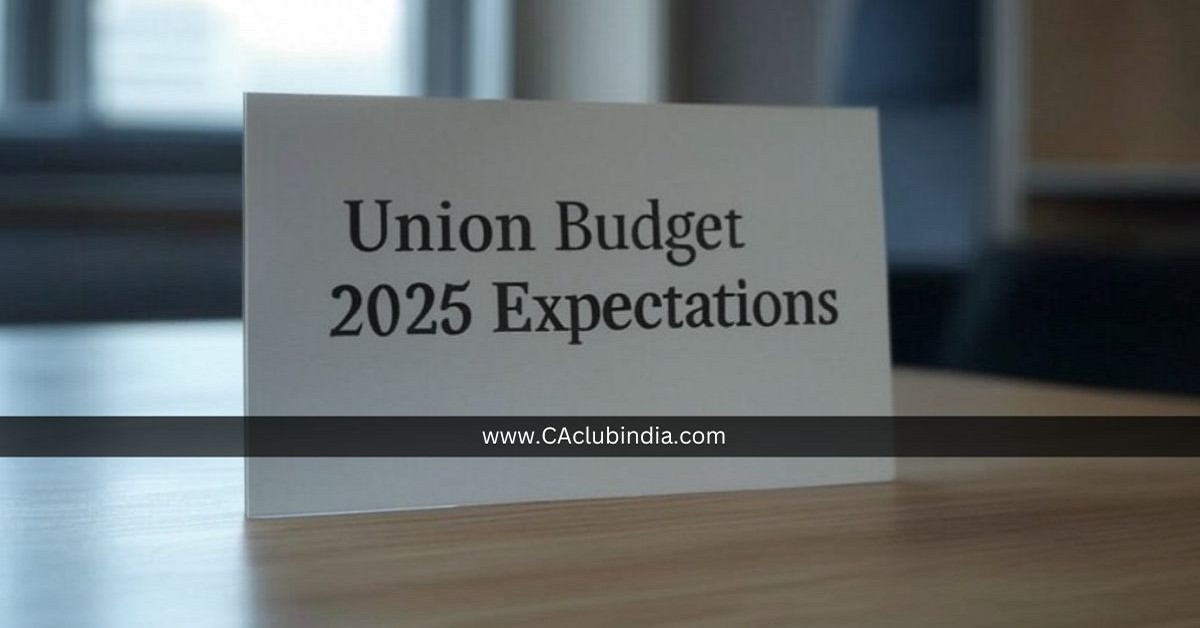As the Union Budget 2025 approaches, several key expectations have emerged across various sectors:
Foreign Direct Investment (FDI)
To enhance India's share in global FDI, the government is anticipated to introduce policies targeting high-growth sectors:
- Technology and Manufacturing: Incentives and tax benefits may be offered to attract investments in semiconductors, electronics, and advanced manufacturing.
- Renewable Energy: Tax breaks and eased regulations could be introduced to draw foreign investments into solar, wind, and electric mobility sectors.

Fiscal Deficit Reduction
The government aims to reduce the fiscal deficit to 4.5% of GDP by FY26, focusing on quality spending and strengthening safety nets for vulnerable populations.
Tax Reforms
Individual taxpayers anticipate several relief measures:
- Increase in Basic Exemption Limit: Potential revision of the basic exemption limit to ₹3 lakh or ₹5 lakh to account for inflation.
- Revision of Section 80C Limit: Expected increase in the deduction limit from ₹1.5 lakh to at least ₹2.5 lakh to encourage savings and investments.
- Enhanced Standard Deduction: Possibility of raising the standard deduction for salaried individuals from ₹50,000 to ₹75,000 or ₹1 lakh.
Infrastructure Development
Significant investments are anticipated in roadways, railways, airports, and renewable energy infrastructure to boost employment and economic growth.
Cybersecurity Measures
Allocations are expected to address the rise in cyber frauds and cyberbullying, including the establishment of specialized cybercrime units and investment in advanced technology.
Empowerment Initiatives
- Women: Focus on access to entrepreneurial funding, social security measures, and skill development initiatives.
- Youth: Resources may be allocated towards skill enhancement in emerging fields like artificial intelligence and renewable energy.
Here are additional expectations for Union Budget 2025 across different areas:
Healthcare
Increased Budget Allocation
- Enhanced funding for public healthcare infrastructure to improve access to hospitals and diagnostics in rural areas.
- Focus on expanding the National Health Mission and Ayushman Bharat health insurance coverage.
Incentives for R&D
- Introduction of tax incentives and funding for pharmaceutical companies focusing on indigenous vaccine development, medical devices, and biotech.
Mental Health Initiatives
- Special provisions for mental health awareness and access to counseling services.
MSME Sector
Credit Support
- Expansion of Emergency Credit Line Guarantee Scheme (ECLGS) and reduction in interest rates for small businesses.
- Simplified processes for availing loans and schemes under Mudra Yojana.
Technology Adoption
- Subsidies for small and medium enterprises adopting new technologies like automation, digitization, and AI.
Exports Incentives
- Boost to MSME exports with simplified compliance procedures and subsidies to enable global competitiveness.
Agriculture and Rural Development
Farm Credit
Increase in agricultural credit target to over ₹25 lakh crore.
Enhanced focus on crop insurance schemes like Pradhan Mantri Fasal Bima Yojana.
Irrigation Projects
Higher allocation for micro-irrigation and sustainable water management practices.
Digital Agri-Tech Support
Promotion of AI and IoT-based solutions for farming through government-backed initiatives and funding.
Green Economy and Climate Action
Incentives for Green Hydrogen
Support for green hydrogen production and storage under the National Green Hydrogen Mission.
Carbon Credit Trading
Framework for carbon trading to incentivize industries reducing emissions.
EV Adoption
Extension of FAME (Faster Adoption and Manufacturing of Electric Vehicles) subsidies and reduction in GST for EVs and charging infrastructure.
Education and Skill Development
Higher Education Reforms
Additional grants for National Education Policy (NEP) implementation focusing on multidisciplinary institutions.
EdTech Collaborations
Public-private partnerships in online education platforms to enhance digital learning in underserved regions.
Skill Training Programs
Expanded allocation for skill development programs, focusing on sectors like AI, robotics, data analytics, and renewable energy.
Technology and Digital India
5G Expansion
Higher investments in telecom infrastructure to support 5G network rollout in Tier 2 and Tier 3 cities.
Startup Ecosystem
Tax exemptions and easier access to funding for early-stage startups.
Expansion of the Startup India Seed Fund Scheme.
AI and Data Centers
Allocations for developing AI-based public infrastructure and setting up data centers across India.









 CAclubindia
CAclubindia
